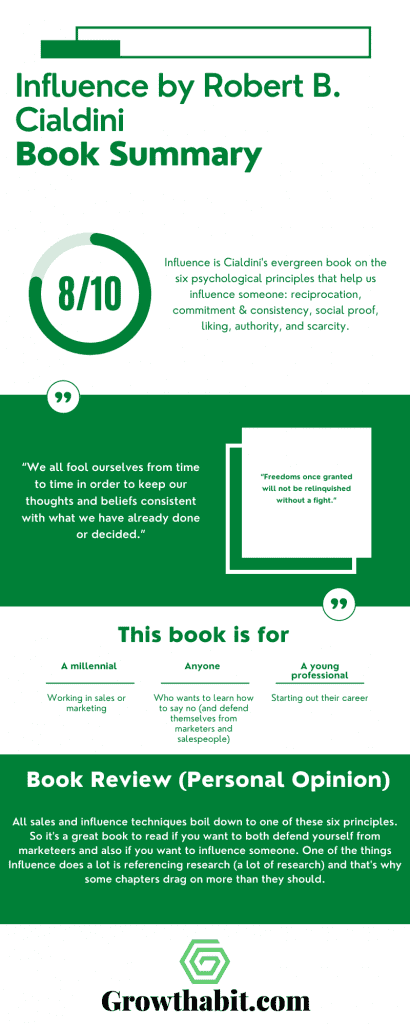Influence is Cialdini’s evergreen book on the six psychological principles that help us influence someone: reciprocation, commitment & consistency, social proof, liking, authority, and scarcity.
Book Title: Influence: The Psychology of Persuasion
Author: Robert B. Cialdini
Date of Reading: January 2017
Rating: 8/10
What Is Being Said In Detail:
Influence has quite a simple premise. Cialdini uses more than 35 years of experience to summarize all of the sales and influence techniques into 6 simple principles. Influence can help you both defend from these techniques and also them (in an ethical way). The six principles are:
- Reciprocation. An internal pull that forces us to repay a favor or anything else the other person did for us (like a trial use of a product).
- Commitment & consistency. Once we make a (public) stand, we will behave in a way that will try to constantly and consistently justify that stand (like signing a letter of endorsement for a candidate).
- Social proof. When we don’t know how to behave in a certain (social) situation, we look at what other people are doing and we mimic it. The more people do something, the more we deem it to be correct (like The Five Monkeys experiment)
- Liking. We tend to agree more with people that we like and others, who like us, tend to agree more with us. This, of course, can be exploited in multiple ways (like gift cards).
- Authority. We are more likely to obey and listen to someone who we perceive has authority—more knowledge, skills, or expertise in a certain field. (like the Millgram experiment).
- Scarcity. We want more of the things that are becoming increasingly unavailable (like the shopping sprees for a limited time only discount).
Most Important Keywords, Sentences, Quotes:
Chapter 1 – WEAPONS OF INFLUENCE
“consistency, reciprocation, social proof, authority, liking, and scarcity—”
“by asking a small favor of people waiting in line to use a library copying machine: Excuse me, I have five pages. May I use the Xerox machine because I’m in a rush? The effectiveness of this request-plus-reason was nearly total: Ninety-four percent of those asked let her skip ahead of them in line.”
“Excuse me, I have five pages. May I use the Xerox machine because I have to make some copies?”
“The customers, mostly well-to-do vacationers with little knowledge of turquoise, were using a standard principle—a stereotype—to guide their buying: “expensive = good.” Thus the vacationers, who wanted “good” jewelry, saw the turquoise pieces as decidedly more valuable and desirable when nothing about them was enhanced but the price. Price alone had become a trigger feature for quality; and a dramatic increase in price alone had led to a dramatic increase in sales among the quality-hungry buyers. Click, whirr!”
“There is a principle in human perception, the contrast principle, that affects the way we see the difference between two things that are presented one after another.”
“and applies to all sorts of perceptions besides weight. If we are talking to a beautiful woman at a cocktail party and are then joined by an unattractive one, the second woman will strike us as less attractive than she actually is. In fact, studies done on the contrast principle at Arizona member of the opposite sex as less attractive if they had first looked through the ads in some popular magazines. In another study, male college-dormitory residents rated the photo of a potential blind date. Those who did so while watching an episode of the Charlie’s Angels TV series viewed the blind date as a less attractive woman than those who rated her while watching a different show. Apparently it was the uncommon beauty of the Angels female stars that made the blind date seem less attractive.”
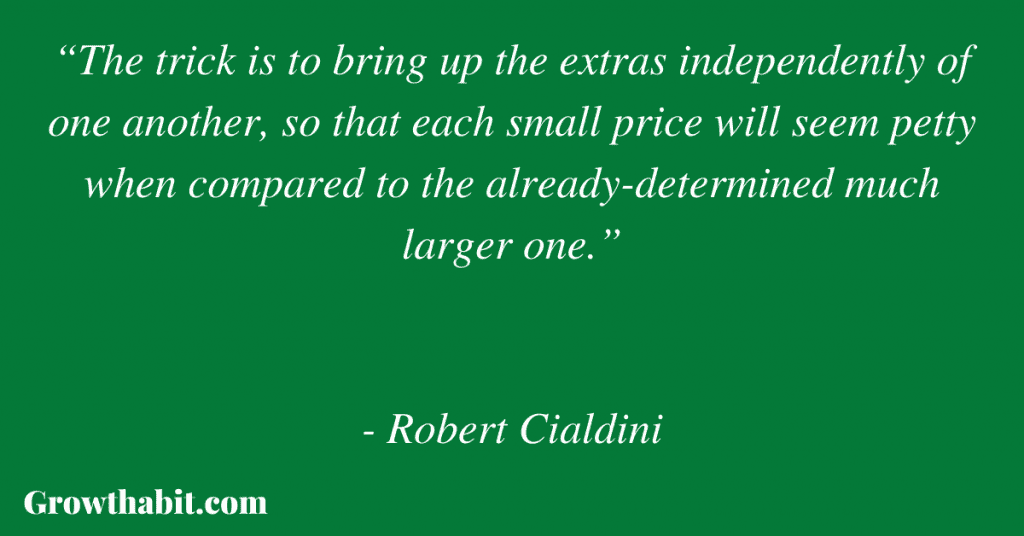
“sweaters, even expensive ones, their prices will not seem as high in comparison. A man might balk at the idea of spending $95 for a sweater, but if he has just bought a $495 suit, a $95 sweater does not seem excessive. The same principle applies to a man who wishes to buy the accessories (shirt, shoes, belt) to go along with his new suit. Contrary to the commonsense view, the evidence supports the contrast-principle prediction.”
“fail to do so will also cause the principle to work actively against them. Presenting an inexpensive product first and following it with an expensive one will cause the expensive item to seem even more costly as a result—hardly a desirable consequence for most sales organizations.”
“The trick is to bring up the extras independently of one another, so that each small price will seem petty when compared to the already-determined much larger one.”
Chapter 2 – RECIPROCATION
“The rule says that we should try to repay, in kind, what another person has provided us.”
”We are human because our ancestors learned to share their food and their skills in an honored network of obligation,”
“During the 1992 presidential primary campaign, actress Sally Kellerman was asked why she was lending her name and efforts to the candidacy of Democratic hopeful Jerry Brown. Her reply: “Twenty years ago, I asked ten friends to help me move. He was the only one who showed up.”
“For instance, the Disabled American Veterans organization reports that its simple mail appeal for donations produces a response rate of about 18 percent. But when the mailing also includes an unsolicited gift (gummed, individualized address labels), the success rate nearly doubles to 35 percent.”
”There is an obligation to give, an obligation to receive, and an obligation to repay.”
“The extent to which even an unwanted favor, once received, can produce indebtedness is aptly illustrated in the soliciting technique of the Hare Krishna Society.”
“About one year ago, I couldn’t start my car. As I was sitting there, a guy in the parking lot came over and eventually jumpstarted the car. I said thanks, and he said you’re welcome; as he was leaving, I said that if he ever needed a favor to stop by. About a month later, the guy knocked on my door and asked to borrow my car for two hours as his was in the shop. I felt somewhat obligated but uncertain, since the car was pretty new and he looked very young. Later, I found out that he was underage and had no insurance. Anyway, I lent him the car. He totaled it.”
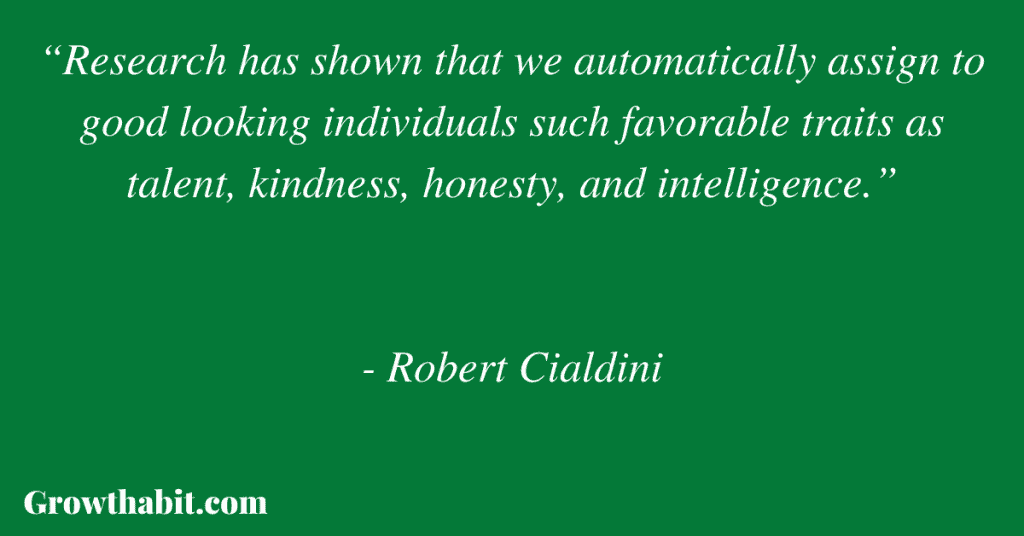
“But there is another reason as well. A person who violates the reciprocity rule by accepting without attempting to return the good acts of others is actively disliked by the social group.”
“The technique is a simple one that we can call the rejection then-retreat technique. Suppose you want me to agree to a certain request. One way to increase your chances would be first to make a larger request of me, one that I will most likely turn down. Then, after I have refused, you would make the smaller request that you were really interested in all along. Provided that you have structured your requests skillfully, I should view your second request as a concession to me and should feel inclined to respond with a concession of my own,”
“Be assured that any strategy able to triple the percentage of compliance with a substantial request (from 17 percent to 50 percent in our experiment)”
Chapter 3 – COMMITMENT AND CONSISTENCY
“If I can get you to make a commitment (that is, to take a stand, to go on record), I will have set the stage for your automatic and ill-considered consistency with that earlier commitment. Once a stand is taken, there is a natural tendency to behave in ways that are stubbornly consistent with the stand.”
“An examination of the Chinese prison-camp program shows that its personnel relied heavily on commitment and consistency pressures to gain the desired compliance from prisoners.”
“The Chinese answer was elementary: Start small and build.”
“For instance, prisoners were frequently asked to make statements so mildly anti-American or pro-Communist as to seem inconsequential (“The United States is not perfect.” “In a Communist country, unemployment is not a problem.”). But once these minor requests were complied with, the men found themselves pushed to submit to related yet more substantive requests. A man who had just agreed with his Chinese interrogator that the United States is not perfect might then be asked to indicate some of the ways in which he thought this was the case. Once he had so explained himself, he might be asked to make a list of these “problems with America” and to sign his name to it. Later he might be asked to read his list in a discussion group with other prisoners. “After all, it’s what you really believe, isn’t it?” Still later he might be asked to write an essay expanding on his list and discussing these problems in greater detail.”
“This was particularly effective in eliciting confessions, self-criticism, and information during interrogation.”
“For the salesperson, the strategy is to obtain a large purchase by starting with a small one. Almost any small sale will do, because the purpose of that small transaction is not profit. It is commitment.”
“The general idea is to pave the way for full-line distribution by starting with a small order…. Look at it this way—when a person has signed an order for your merchandise, even though the profit is so small it hardly compensates for the time and effort of making the call, he is no longer a prospect—he is a customer.”
“the foot-in-the door technique.”
“What may occur is a change in the person’s feelings about getting involved or taking action. Once he has agreed to a request, his attitude may change, he may become, in his own eyes, the kind of person who does this sort of thing, who agrees to requests made by strangers, who takes action on things he believes in, who cooperates with good causes.”
“Not all commitments affect self-image, however. There are certain conditions that should be present for a commitment to be effective in this way. To discover what they are, we can once again look to the American experience in the Chinese prison camps of Korea. It is important to understand that the major intent of the Chinese was not simply to extract information from their prisoners. It was to indoctrinate them, to change their attitudes and perceptions of themselves, of their political system, of their country’s role in the war, and of communism. And there is evidence that the program often worked alarmingly well.”
“Many expressed antipathy toward the Chinese Communists but at the same time praised them for “the fine job they have done in China.” Others stated that “although communism won’t work in America, I think it’s a good thing for Asia.”
“A further technique was to have the man write out the question and then the [pro-Communist] answer. If he refused to write it voluntarily, he was asked to copy it from the notebooks, which must have seemed like a harmless enough concession.”
“One final tip before you get started: Set a goal and write it down. Whatever the goal, the important thing is that you set it, so you’ve got something for which to aim—and that you write it down. There is something magical about writing things down. So set a goal and write it down. When you reach that goal, set another and write that down. You’ll be off and running.”
“Yet another reason that written commitments are so effective is that they require more work than verbal ones. And the evidence is clear that the more effort that goes into a commitment, the greater is its ability to influence the attitudes of the person who made it.”
“My own view is that the answer appeared in 1959 in the results of a study little known outside of social psychology. A pair of young researchers, Elliot Aronson and Judson Mills, decided to test their observation that “persons who go through a great deal of trouble or pain to attain something tend to value it more highly than persons who attain the same thing with a minimum of effort.”
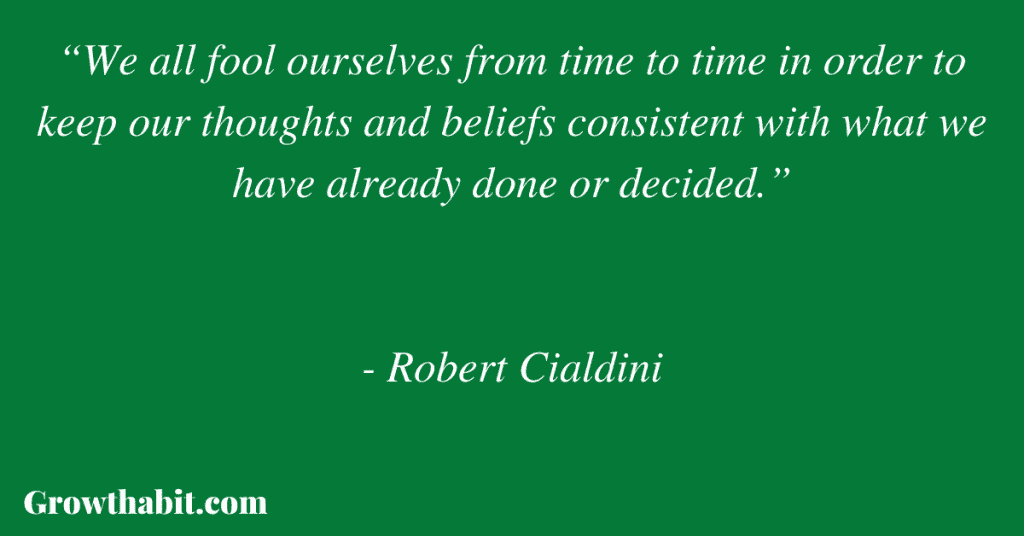
“The loyalty and dedication of those who emerge will increase to a great degree the chances of group cohesiveness and survival. Indeed, one study of fifty-four tribal cultures found that those with the most dramatic and stringent initiation ceremonies were those with the greatest group solidarity.”
”There is no ex-Marine of my acquaintance, regardless of what direction he may have taken spiritually or politically after those callow gung-ho days, who does not view the training as a crucible out of which he emerged in some way more resilient, simply braver and better for the wear.”
“Although the settings are quite different, the surveyed fraternities refused to allow civic activities into their initiation ceremonies for the same reason that the Chinese withheld large prizes in favor of less powerful inducements: They wanted the men to own what they had done.”
“No excuses, no ways out were allowed. A man who suffered through an arduous hazing could not be given the chance to believe he did so for charitable purposes. A prisoner who salted his political essay with a few antiAmerican comments could not be permitted to shrug it off as motivated by a big reward. No, the fraternity chapters and Chinese Communists were playing for keeps. It was not enough to wring commitments out of their men; those men had to be made to take inner responsibility for their actions.”
“Social scientists have determined that we accept inner responsibility for a behavior when we think we have chosen to perform it in the absence of strong outside pressures. A large reward is one such external pressure. It may get us to perform a certain action, but it won’t get us to accept inner responsibility for the act. Consequently, we won’t feel committed to it. The same is true of a strong threat; it may motivate immediate compliance, but it is unlikely to produce long-term commitment.”
“There is yet another attraction in commitments that lead to inner change—they grow their own legs.”
“The advantage to an unscrupulous compliance professional is tremendous. Because we build new struts to undergird choices we have committed ourselves to, an exploitative individual can offer us an inducement for making such a choice, and after the decision has been made, can remove that inducement, knowing that our decision will probably stand on its own newly created legs.”
Chapter 4 – SOCIAL PROOF
“the principle of social proof. It states that one means we use to determine what is correct is to find out what other people think is correct. The principle applies especially to the way we decide what constitutes correct behavior. We view a behavior as more correct in a given situation to the degree that we see others performing it.”
“Our tendency to assume that an action is more correct if others are doing it is exploited in a variety of settings. Bartenders often “salt” their tip jars with a few dollar bills at the beginning of the evening to simulate tips left by prior customers and thereby to give the impression that tipping with folding money is proper barroom behavior.”
”Since 95 percent of the people are imitators and only 5 percent initiators, people are persuaded more by the actions of others than by any proof we can offer.”
“The principle of social proof says so: The greater the number of people who find any idea correct, the more the idea will be correct. The group’s assignment was clear; since the physical evidence could not be changed, the social evidence had to be. Convince and ye shall be convinced!”
“Those people are probably examining the social evidence, too. Especially in an ambiguous situation, the tendency for everyone to be looking to see what everyone else is doing can lead to a fascinating phenomenon called “pluralistic ignorance.”
“This, according to Latané and Darley, is the state of pluralistic ignorance “in which each person decides that since nobody is concerned, nothing is wrong. Meanwhile, the danger may be mounting to the point where a single individual, uninfluenced by the seeming calm of others, would react.”
“His name is David Phillips, and he points a convincing finger at something called the “Werther effect.”
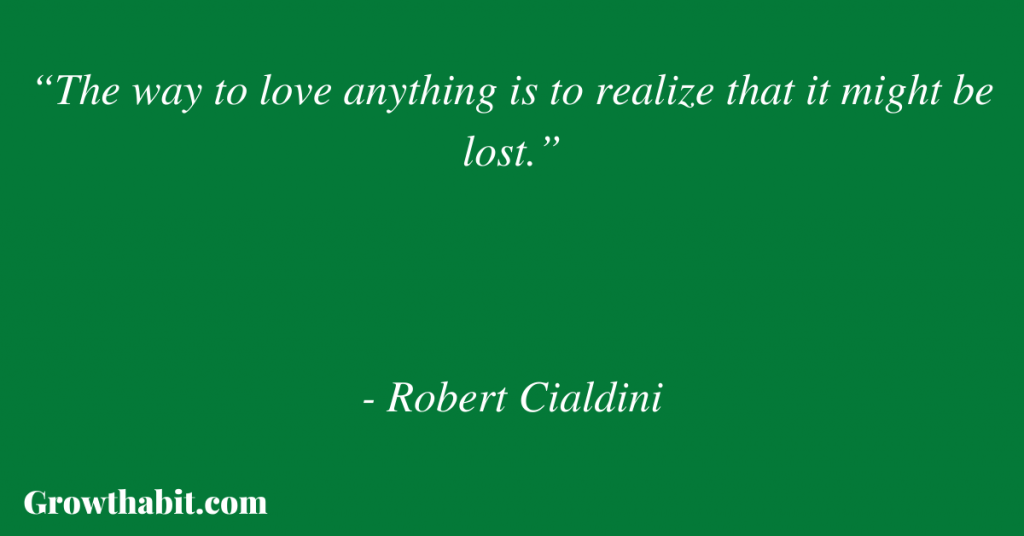
“Phillips got his evidence for the modern-day Werther effect by examining the suicide statistics in the United States between 1947 and 1968. He found that within two months after every front-page suicide story, an average of fifty-eight more people than usual killed themselves. In a sense, each suicide story killed fifty-eight people who otherwise would have gone on living. Phillips also found that this tendency for suicides to beget suicides occurred principally in those parts of the country where the first suicide was highly publicized and that the wider the publicity given the first suicide, the greater the number of later suicides.”
“people decide that suicide is an appropriate action for themselves as well. Some of these individuals then proceed to commit the act in a straightforward, no-bones-about-it fashion, causing the suicide rate to jump.”
“Thus the alarming climb in crash fatalities we find following front-page suicides is, according to Dr. Phillips, most likely due to the Werther effect secretly applied.”
“Ah, uncertainty—the right-hand man of the principle of social proof. We have already seen that when people are uncertain, they look to the actions of others to guide their own actions.”
“Once again we can see that social proof is most powerful for those who feel unfamiliar or unsure in a specific situation and who, consequently, must look outside of themselves for evidence of how best to behave there.”
Chapter 5 – LIKING
“remarkable. It was recently estimated that Tupperware sales exceed $2.5 million a day!”
“The Shaklee Corporation, which specializes in door-to-door sales of various home-related products, advises its salespeople to use the “endless chain” method for finding new customers. Once a customer admits to liking a product, he or she can be pressed for the names of friends who would also appreciate learning about it. The individuals on that list can then be approached for sales and a list of their friends, who can serve as sources for still other potential customers, and so on in an endless chain. The key to the success of this method is that each new prospect is visited by a salesperson armed with the name of a friend “who suggested I call on you.” Turning the salesperson away under those circumstances is difficult; it’s almost like rejecting the friend. The Shaklee sales manual insists that employees use this system without fail:”
“in Detroit, Joe Girard, who specialized in using the liking rule to sell Chevrolets. He became wealthy in the process, making more than two hundred thousand dollars a year. With such a salary, we might guess that he was a high-level GM executive or perhaps the owner of a Chevrolet dealership. But no. He made his money as a salesman on the showroom floor. At what he did, he was phenomenal. For twelve years straight, he won the title as the “number one car salesman”; he averaged more than five cars and trucks sold every day he worked; and he has been called the world’s “greatest car salesman” by the Guinness Book of World Records.”
“Research has shown that we automatically assign to good looking individuals such favorable traits as talent, kindness, honesty, and intelligence.”
“Remember Joe Girard, the world’s “greatest car salesman,” who says the secret of his success was getting customers to like him? He did something that, on the face of it, seems foolish and costly. Each month he sent every one of his more than thirteen thousand former customers a holiday greeting card containing a personal message. The holiday greeting changed from month to month (Happy New Year or Happy Thanksgiving, etc.), but the message printed on the face of the card never varied. It read, “I like you.” As Joe explained it, “There’s nothing else on the card. Nothin’ but my name. I’m just telling ’em that I like ’em.”
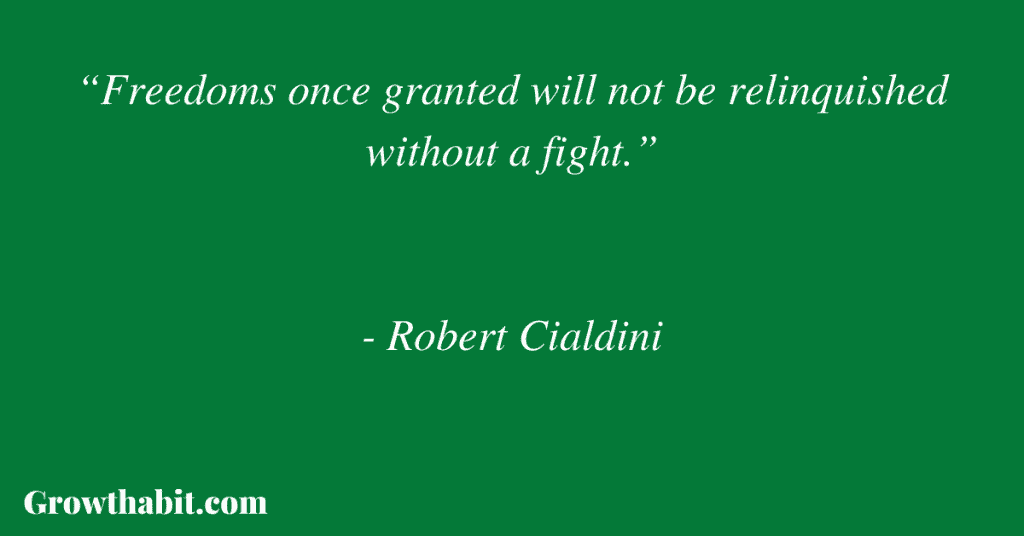
“Positive comments produced just as much liking for the flatterer when they were untrue as when they were true.”
“more interethnic interaction, research shows that becoming familiar with something through repeated contact doesn’t necessarily cause greater liking. In fact, continued exposure to a person or object under unpleasant conditions such as frustration, conflict, or competition leads to less liking.”
“As for the positive associations, it is the compliance professionals who teach the lesson. They are incessantly trying to connect themselves or their products with the things we like. Did you ever wonder what all those good-looking models are doing standing around in the automobile ads? What the advertiser hopes they are doing is lending their positive traits—beauty and desirability—to the cars. The advertiser is betting that we will respond to the product in the same ways we respond to the attractive models merely associated with it.”
“And they are right. In one study, men who saw a new-car ad that included a seductive young woman model rated the car as faster, more appealing, more expensive-looking, and better designed than did men who viewed the same ad without the model. Yet when asked later, the men refused to believe that the presence of the young woman had influenced their judgments.”
“So we want our affiliated sports teams to win to prove our own superiority. But to whom are we trying to prove it? Ourselves, certainly; but to everyone else, too. According to the association principle, if we can surround ourselves with success that we are connected with in even a superficial way (for example, place of residence), our public prestige will rise.”
“Are sports fans right to think that without ever throwing a block, catching a ball, scoring a goal, or perhaps even attending a game, they will receive some of the glory from a hometown championship? I believe so. The evidence is in their favor. Recall that Persia’s messengers did not have to cause the news, my weatherman did not have to cause the weather, and Pavlov’s bell did not have to cause the food for powerful effects to occur. The association was enough.”
“Have you noticed, for example, how often after a home-team victory fans crowd into the range of a TV camera, thrust their index fingers high, and shout, “We’re number one! We’re number one!” Note that the call is not “They’re number one” or even “Our team is number one.” The pronoun is “we,” designed to imply the closest possible identity with the team.”
Chapter 6 – AUTHORITY
“When it is their job, how much suffering will ordinary people be willing to inflict on an entirely innocent other person?”
“These results surprised everyone associated with the project, Milgram included. In fact, before the study began, he asked groups of colleagues, graduate students, and psychology majors at Yale University (where the experiment was performed) to read a copy of the experimental procedures and estimate how many subjects would go all the way to the last (450-volt) shock. Invariably, the answers fell in the 1 to 2 percent range. A separate group of thirty-nine psychiatrists predicted that only about one person in a thousand would be willing to continue to the end. No one, then, was prepared for the behavior patterns that the experiment actually produced.”
“I observed a mature and initially poised businessman enter the laboratory smiling and confident. Within twenty minutes he was reduced to a twitching, stuttering wreck who was rapidly approaching a point of nervous collapse. He constantly pulled on his earlobe and twisted his hands. At one point he pushed his fist into his forehead and muttered: “Oh, God, let’s stop it.” And yet he continued to respond to every word of the experimenter and obeyed to the end.”
” There are sobering implications of this finding for those concerned about the ability of another form of authority—government—to extract frightening levels of obedience from ordinary citizens.”
“The worrisome possibility arises, then, that when a physician makes a clear error, no one lower in the hierarchy will think to question it—precisely because, once a legitimate authority has given an order, subordinates stop thinking in the situation and start reacting.”
”How truthful can we expect the expert to be here?”
“quickly learned that his style was to have no single style. He had a repertoire of them, each ready to be called on under the appropriate circumstances. When the customers were a family, he was effervescent—even slightly clownish—directing his remarks as often to the children as to the adults. With a young couple on a date, he became formal and a bit imperious in an attempt to intimidate the young man (to whom he spoke exclusively) into ordering and tipping lavishly. With an older, married couple, he retained the formality but dropped the superior air in favor of a respectful orientation to both members of the couple. Should the patron be dining alone, Vincent selected a friendly demeanor—cordial, conversational, and warm.”
Chapter 7 – SCARCITY
“Since that encounter with the scarcity principle—that opportunities seem more valuable to us when their availability is limited—I have begun to notice its influence over a whole range of my actions. For instance, I routinely will interrupt an interesting face-to-face conversation to answer the ring of an unknown caller. In such a situation, the caller has a compelling feature that my face-to-face partner does not:potential unavailability.”
“According to the theory, whenever free choice is limited or threatened, the need to retain our freedoms makes us desire them (as well as the goods and services associated with them) significantly more than previously. So when increasing scarcity—or anything else—interferes with our prior access to some item, we will react against the interference by wanting and trying to possess the item more than before.”
“When our freedom to have something is limited, the item becomes less available, and we experience an increased desire for it.”
“Compared to the customers who got only the standard sales appeal, those who were also told about the future scarcity of beef bought more than twice as much. But the real boost in sales occurred among the customers who heard of the impending scarcity via “exclusive” information. They purchased six times the amount that the customers who received only the standard sales pitch did.
“Apparently, the fact that the news carrying the scarcity of information was itself scarce made it especially persuasive.”
“our predicament, then: Knowing the causes and workings of scarcity pressures may not be sufficient to protect us from them because knowing is a cognitive thing, and cognitive processes are suppressed by our emotional reaction to scarcity. In fact, this may be the reason for the great effectiveness of scarcity tactics. When they are employed properly, our first line of defense against foolish behavior—a thoughtful analysis of the situation—becomes less likely.”
Epilogue – INSTANT INFLUENCE
“Very often in making a decision about someone or something, we don’t use all the relevant available information; we use, instead, only a single, highly representative piece of the total.”
“Because technology can evolve much faster than we can, our natural capacity to process information is likely to be increasingly inadequate to handle the surfeit of change, choice, and challenge that is characteristic of modern life.”
Book Review (Personal Opinion):
All sales and influence techniques boil down to one of these six principles. So it’s a great book to read if you want to both defend yourself from marketeers and also if you want to influence someone. One of the things Influence does a lot is referencing research (a lot of research) and that’s why some chapters drag on more than they should.
Rating: 8/10
This Book Is For (Recommend):
- A young professional starting out their career
- A millennial working in sales or marketing
- Anyone who wants to learn how to say no (and defend themselves from marketers and salespeople)
If You Want To Learn More
Here’s Robert Cialdini having a speech at a conference about Influence.
World Minds
How I’ve Implemented The Ideas From The Book
The entire online business model is built on these principles. You download a free ebook/cheat sheet/one-pager (reciprocation to buy something else). You’re asked to comment or subscribe to posts so that you stay consistent with your actions. Authority is when you believe the things I write here because I wrote hundreds of reviews and read thousands of books.
All of these principles are valuable to know and implement in any sphere of your life.
One Small Actionable Step You Can Do
Try out two things: The first one is to try to pinpoint when a person will use any of these six principles to influence you in one way or the other.
The second is for you to use one of these six principles to influence someone…today. The principles have such a wide variety of applications that you can probably use at least one of them in the next 5 minutes.
